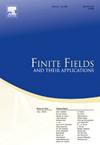函数域中的概率伽罗瓦理论
IF 1.2
3区 数学
Q1 MATHEMATICS
引用次数: 0
摘要
我们研究了函数域上随机多项式的不可还原性和伽罗瓦群。我们证明,随机多项式 f=yn+∑i=0n-1ai(x)yi∈Fq[x][y] 的 i.i.d. 系数 ai 以均匀概率在集合 {a(x)∈Fq[x]:dega≤d} 中取值,当 n→∞ 时,d 和 q 是固定的,以趋近于 1-1qd 的概率不可约。我们还证明,以同样的概率,这个随机多项式的伽罗瓦群包含交替群 An。此外,我们还证明,如果我们假设 Fq[x] 上多项式周拉猜想的一个版本,那么这个多项式的伽洛伊群实际上等于对称群 Sn,概率趋于 1-1qd。我们还研究了以正极限概率出现的其他可能的伽罗瓦群。最后,我们研究了 n 固定且 d→∞ 时的相同问题。本文章由计算机程序翻译,如有差异,请以英文原文为准。
Probabilistic Galois theory in function fields
We study the irreducibility and Galois group of random polynomials over function fields. We prove that a random polynomial with i.i.d. coefficients taking values in the set with uniform probability, is irreducible with probability tending to as , where d and q are fixed. We also prove that with the same probability, the Galois group of this random polynomial contains the alternating group . Moreover, we prove that if we assume a version of the polynomial Chowla conjecture over , then the Galois group of this polynomial is actually equal to the symmetric group with probability tending to . We also study the other possible Galois groups occurring with positive limit probability. Finally, we study the same problems with n fixed and .
求助全文
通过发布文献求助,成功后即可免费获取论文全文。
去求助
来源期刊
CiteScore
2.00
自引率
20.00%
发文量
133
审稿时长
6-12 weeks
期刊介绍:
Finite Fields and Their Applications is a peer-reviewed technical journal publishing papers in finite field theory as well as in applications of finite fields. As a result of applications in a wide variety of areas, finite fields are increasingly important in several areas of mathematics, including linear and abstract algebra, number theory and algebraic geometry, as well as in computer science, statistics, information theory, and engineering.
For cohesion, and because so many applications rely on various theoretical properties of finite fields, it is essential that there be a core of high-quality papers on theoretical aspects. In addition, since much of the vitality of the area comes from computational problems, the journal publishes papers on computational aspects of finite fields as well as on algorithms and complexity of finite field-related methods.
The journal also publishes papers in various applications including, but not limited to, algebraic coding theory, cryptology, combinatorial design theory, pseudorandom number generation, and linear recurring sequences. There are other areas of application to be included, but the important point is that finite fields play a nontrivial role in the theory, application, or algorithm.

 求助内容:
求助内容: 应助结果提醒方式:
应助结果提醒方式:


